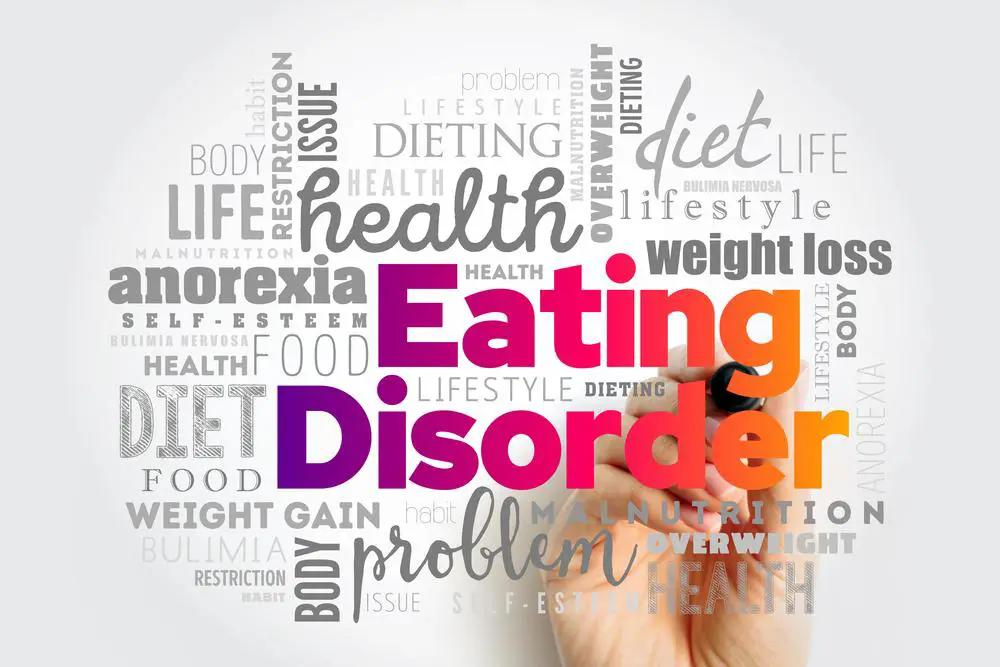As a BetterHelp affiliate, we receive compensation from BetterHelp if you purchase products or services through the links provided
Eating disorders are complex mental health conditions that involve irregular eating habits and distorted thoughts about food, body weight, and shape. Triggers play a significant role in the development and persistence of these disorders, making it crucial to understand their various causes to manage them effectively. These triggers range from societal pressures and emotional stressors to genetic predispositions and personal experiences.
Comprehending the nature of eating disorder triggers can empower individuals suffering from these conditions to take control of their mental and physical well-being. By recognizing the specific factors that may initiate or exacerbate disordered eating behaviors, one can work to address or avoid these factors. With the proper support and resources, overcoming eating disorders and fostering a healthy relationship with food is well within reach.
Key Takeaways
- Eating disorder triggers span a range of social, emotional, and genetic factors.
- Identifying and addressing triggers can help individuals manage and overcome eating disorders.
- Support and resources are available to foster a healthy relationship with food and body image.
 Understanding Eating Disorders
Understanding Eating Disorders
Eating disorders are serious and often life-threatening illnesses that involve severe disturbances in people’s eating behaviors, as well as related thoughts and emotions. Common eating disorders you might encounter include anorexia nervosa, bulimia nervosa, binge-eating disorder, and avoidant/restrictive food intake disorder.
Anorexia nervosa is characterized by an intense fear of gaining weight, a distorted body image, and severely restricting food intake, leading to dangerous weight loss. People with bulimia nervosa, on the other hand, experience episodes of binge eating followed by purging behaviors, such as vomiting, fasting, or excessive exercise to prevent weight gain.
Binge-eating disorder, as the name suggests, involves consuming large amounts of food quickly. Unlike bulimia, individuals with binge-eating disorder do not engage in purging behaviors. They may feel a lack of control over their eating habits and suffer guilt or shame afterward.
Avoidant/restrictive food intake disorder (ARFID) is characterized by a persistent failure to maintain adequate nutritional intake, leading to weight loss or other health issues. This can result from a lack of interest in eating, an aversion to certain food textures, or fear of negative consequences, such as choking or vomiting.
It’s essential to recognize that each disorder has unique characteristics and varies in symptoms and severity. Understanding these eating disorders can help you or someone you know to identify the warning signs and seek timely help. Major factors that contribute to eating disorders include genetic predisposition, psychological traits, social influences, and environmental triggers.
 General Triggers of Eating Disorders
General Triggers of Eating Disorders
Eating disorders are complex conditions that can arise from various factors. This section will discuss some general triggers that may contribute to the development or worsening of these disorders.
Stress and Emotions: Changes in life circumstances, such as moving, starting a new job, or experiencing a breakup, can create stress and bring about emotional turmoil. This upheaval can sometimes lead to disordered eating patterns as a way to cope. For example, turning to food for comfort or restricting intake to regain a sense of control, can potentially develop into an eating disorder.
Body Dissatisfaction: A negative perception of one’s body image and weight can be a significant trigger for eating disorders. This dissatisfaction can stem from societal standards of beauty, which often promote unrealistic, unattainable body ideals. The pressure to conform to these expectations may lead to unhealthy behaviors, such as extreme dieting, excessive exercise, or even purging to maintain a certain body size or shape.
Mental Health: Depression, anxiety, and trauma can contribute to the development of eating disorders. Feelings of hopelessness, low self-esteem, or a history of abuse may lead to the use of disordered eating as a coping mechanism. For example, someone struggling with anxiety might develop strict food rules and rituals in response to fears about weight gain.
Genetics and Environment: Some individuals have a genetic predisposition to develop eating disorders, which means they may be more susceptible due to factors in their DNA. Environmental influences, such as exposure to diet culture, peer pressure, or a family history of eating disorders, may also contribute to the onset of these conditions. Moreover, certain lifestyle choices like participation in sports or careers focused on appearance, such as dance or modeling, can increase the risk of developing disordered eating patterns.
To summarize, various triggers, including stress, emotions, body dissatisfaction, mental health, genetics, and environmental factors, can contribute to the development or worsening of eating disorders. Recognizing these triggers can be crucial in understanding and managing these complex conditions.
Specific Eating Disorder Triggers
 Anorexia Nervosa Triggers
Anorexia Nervosa Triggers
Anorexia nervosa is a life-threatening eating disorder characterized by an extreme fear of gaining weight, body dissatisfaction, and restricting food intake. Some common triggers for anorexia include:
- Dieting: Engaging in strict or extreme dieting can lead to an obsessive focus on weight and calories, increasing the risk of developing anorexia nervosa.
- Low self-esteem: Feeling inadequate or inferior can contribute to a distorted self-image and drive individuals to strive for a thin-ideal appearance.
- Peer or societal pressure: Regular exposure to images of thin bodies and a culture that prizes being thin can intensify a desire for a slimmer appearance, fueling anorexic behaviors.
Bulimia Nervosa Triggers
Bulimia nervosa is an eating disorder where individuals engage in cycles of binge eating followed by purging behaviors, such as vomiting or excessive exercise. Common triggers for bulimia may include:
- Stress: A high level of stress can cause individuals to engage in binge eating as a coping mechanism, followed by feelings of guilt and purging.
- Eating alone or in secret: Disordered eating habits can be exacerbated when individuals need to hide their food consumption from others.
- Body dissatisfaction: An intense focus on body shape and appearance can drive repetitive cycles of bingeing and purging in individuals with bulimia.
 Binge Eating Disorder Triggers
Binge Eating Disorder Triggers
Unlike anorexia and bulimia, binge eating disorder involves uncontrolled, excessive food intake without purging behaviors. Known triggers for binge eating disorder include:
- Emotional distress: Emotional turmoil can lead to consuming large amounts of food as a comfort or distraction.
- Lack of structure: An irregular meal schedule and structure can contribute to episodes of binge eating when individuals overeat to compensate for skipped meals.
- Dietary restrictions: Placing extreme limits on certain foods or types of food can result in binge eating episodes once access to these foods is regained.
Remember, identifying and understanding these specific triggers can help you or your loved ones take appropriate actions to manage and overcome eating disorders.
Physical and Health Implications
Eating disorders can lead to a wide range of physical and health problems. As you struggle with these disorders, your body’s overall health and stability may be compromised. Some of the most common health issues you may face include:
- Fluctuations in body weight: This can result from binge eating or restricting food intake, which can lead to becoming overweight, underweight, or even dangerously malnourished.
- Heart complications: Abnormal eating patterns can strain your heart by causing electrolyte imbalances, high or low blood pressure, and irregular heartbeats.
- Increased risk of type 2 diabetes: If you’re overweight or obese due to an eating disorder, you may be at an increased risk of developing type 2 diabetes.
- Physical symptoms: These can include fatigue, dizziness, muscle weakness or cramps, hair loss, brittle nails, and anemia.
To minimize the risk of such health complications, seeking medical help and support is crucial. A healthcare professional can help you devise a plan to manage and overcome the eating disorder while monitoring your overall health.
Proper nutrition plays a crucial role in the management of your health, especially when dealing with an eating disorder. You may need to consult a professional nutritionist or dietitian to ensure you get the right balance of nutrients and calories. They can help create a customized meal plan for your needs and requirements.
Along with a balanced diet, you may also need to include dietary supplements or herbal products to address deficiencies or promote general health. It’s essential to consult a healthcare professional before adding any supplements to your routine, as these products can sometimes interfere with medications or have unwanted side effects.
Remember, taking care of your physical and emotional well-being is a crucial step toward overcoming the challenges of an eating disorder. Seek professionals, friends, and family support to help you navigate this journey.
 Psychological Factors and Eating Disorders
Psychological Factors and Eating Disorders
A variety of psychological factors can trigger eating disorders. Mental health issues, such as depression, anxiety, and trauma, often play a significant role in the development of these disorders. Negative emotions and thoughts, like shame, guilt, body dissatisfaction, and low self-esteem, can contribute to unhealthy eating behaviors.
People who struggle with eating disorders often experience intense feelings of shame and guilt related to their body image. This can lead them to feel highly dissatisfied with their appearance, which can then fuel disordered eating patterns. Recognizing these thoughts and emotions is essential, as improving your mental health can significantly improve your recovery.
Young adults may be particularly vulnerable to developing eating disorders due to the various emotional challenges they may face during this stage in life. They might feel immense pressure to conform to societal beauty standards or live up to expectations from peers and family members. Moreover, negative emotions like boredom or anxiety can lead to unhealthy coping mechanisms like binge eating or restricting food intake.
Mindfulness can be a helpful strategy to identify and manage the emotions and thoughts that contribute to eating disorder behaviors. By practicing mindfulness, you can become more aware of your thought patterns and develop the skills to replace negative thoughts with healthier, more balanced ones. This approach can also help you build self-esteem and foster a more positive body image.
Remember, it’s essential to confide in someone when you’re struggling with an eating disorder. You don’t have to feel ashamed about your situation, and talking to a trusted friend, family member, or mental health professional can provide the support and guidance you need during your recovery journey.
Role of Genetics and Epigenetics in Eating Disorders
Understanding the role of genetics and epigenetics is crucial to recognizing the complexity of eating disorders. In this section, you will learn about the part they play in anorexia nervosa (AN), bulimia nervosa (BN), and binge eating disorder (BED).
Genetics is one of the factors in the etiology of eating disorders. Research over the past decade has confirmed that genes contribute to the development of these illnesses. The complex symptoms characterizing eating disorders often arise through the activation of latent genetic potentials by environmental exposures.
Epigenetics is the link connecting environmental exposures to gene expression. Epigenetic mechanisms, such as DNA methylation, are ways our bodies modify genetic activity without changing the underlying DNA sequence. These modifications are responsible for the way environmental factors, like stress or trauma, interact with genetic predispositions, increasing the likelihood of developing an eating disorder.
Here are some key points to consider:
- Most epigenetic analyses have focused on gene methylation in anorexia and bulimia nervosa, providing insights into their complex etiology.
- Genes play a role in the development of major eating disorders like AN, BN, and BED.
- Epigenetic mechanisms link environmental exposures, like stress or trauma, to gene expression, thus contributing to the development of eating disorders.
By understanding the connection between genetics and epigenetics, you can better understand the development and manifestation of eating disorders. Recognizing these factors may lead to more personalized treatment approaches and contribute to a better understanding of recovery from these complex conditions.

Effects of Dieting and Weight Control Behaviors
Focusing on managing your body weight and appearance may lead to various consequences when you engage in dieting and weight control behaviors. Some of the effects of these actions involve your food intake, emotions, and mental state.
Restricting your food intake and skipping meals might seem an excellent way to manage your weight and body shape. However, doing so can negatively affect your mood and overall health. You may obsess over calories, portion sizes, and food types, resulting in heightened stress and feelings of inadequacy. Additionally, you might develop a poor body image and self-esteem, which can contribute to the onset of an eating disorder.
Binge eating and purging are other behaviors associated with weight control that can have negative consequences. Bingeing refers to consuming large amounts of food quickly, often followed by feelings of guilt and shame. To counteract the calories consumed during a binge, you might engage in purging through self-induced vomiting, misuse of laxatives, or excessive exercise. Despite these harmful behaviors, your body weight may continue to fluctuate.
Using diet aids and over-relying on them can also have detrimental effects on your well-being. Some diet aids block the absorption of certain nutrients, leading to nutrient deficiencies and negatively impacting your health. Overuse of these products can also cause side effects, such as dizziness, dehydration, and even dependence on the aids themselves.
Focusing on achieving a specific body shape or appearance can be damaging to your mental and emotional health. Unrealistic expectations can perpetuate an unhealthy relationship with your body, leading to the development or worsening of eating disorders.
In conclusion, the pursuit of dieting and weight control behaviors can lead to a host of adverse effects on your physical, mental, and emotional well-being. It is essential to prioritize a balanced lifestyle and a healthy relationship with food to maintain your overall health.
Key takeaway: Dieting and weight control behaviors can have various adverse effects on your physical, emotional, and mental health. Focusing on a balanced lifestyle and a positive relationship with food can help you avoid these consequences and maintain overall well-being.
 Prevention and Management
Prevention and Management
Preventing and managing eating disorders begins with understanding the triggers and addressing the underlying issues. Fostering a healthy body image and promoting self-confidence is crucial for long-term well-being. Here are some strategies you can follow:
- Communicate openly with your healthcare provider and seek professional help if you’re struggling with body image or disordered eating patterns. They can help identify potential triggers and provide guidance for recovery.
- Surround yourself with support: Engage in meaningful relationships with friends and family who promote a positive body image, and consider joining support groups or online communities where individuals share their experiences and offer mutual understanding.
- Educate yourself: Study the latest research on eating disorders, their causes, and treatment options. This will help you make informed decisions and understand the recovery process better.
- Practice self-care: Develop habits that contribute to your overall well-being, such as regular exercise, proper nutrition, and stress management. Maintaining a balanced lifestyle and prioritizing self-care is essential, as it plays a significant role in prevention and recovery.
- Set realistic goals: When working towards a healthier body image, establish achievable and realistic goals. This approach will boost your confidence and reduce the likelihood of engaging in disordered eating behaviors.
Remember, seeking help from a healthcare provider and surrounding yourself with a supportive network are crucial in recovery. Additionally, you’ll be well-equipped to prevent and manage eating disorders effectively by focusing strongly on personal well-being, promoting a healthy body image, and staying informed through study and research.

Crossing the Line: Recognizing When It’s Time to Seek Help for Your Eating Disorder
In the journey of understanding and managing eating disorders, it’s crucial to identify when the situation escalates beyond one’s control and requires professional intervention. Recognizing these signs can be the first step toward recovery:
- Constant Preoccupation with Weight and Food: If thoughts about weight, food, and body image are overwhelming and persistent, it might indicate a deeper issue.
- Significant Impact on Daily Life: When an eating disorder starts to interfere significantly with your daily activities, relationships, work, or education, it’s a clear sign that help is needed.
- Physical Health Deterioration: Noticeable physical symptoms such as extreme weight loss or gain, dental problems, hair loss, or menstrual irregularities are red flags.
- Extreme Food Behaviors: This includes severe restriction, binge eating, purging, or obsessive calorie counting.
- Emotional and Mental Distress: Increased feelings of guilt, shame, anxiety, or depression related to eating or body image are vital indicators.
- Social Isolation: Withdrawing from friends, family, and social activities, especially food-related ones, can indicate an escalating problem.
Steps to Take for Help:
- Reach Out for Support: Confiding in someone you trust can be a decisive first step. This could be a friend, family member, or counselor.
- Professional Assistance: Seeking help from healthcare professionals, such as therapists, dietitians, or doctors specializing in eating disorders, is crucial.
- Educate Yourself: Understanding your eating disorder can empower you to seek the right help and advocate for your needs.
Remember, acknowledging that you need help is a brave and vital step towards recovery. You deserve support and care; many resources are available to assist you on this journey.
Frequently Asked Questions
What are common environmental triggers for eating disorders?
Environmental triggers for eating disorders can include pressure from peers, family members, or coaches to maintain a certain weight or physical appearance. Diet culture, food messages in media, and cultural beauty standards might also contribute to the development of an eating disorder. It’s essential to be aware of these triggers in your surroundings and promote a healthy body image for yourself and others.
How can emotions influence the development of an eating disorder?
Emotions can play a significant role in the development of an eating disorder. You might find yourself turning to food for comfort in times of stress or using it as a coping mechanism to deal with difficult emotions. People with eating disorders often have trouble expressing and processing their emotions, which can trigger disordered eating behaviors. Learning healthy strategies for managing your emotions is crucial in reducing the risk of developing an eating disorder.
What role does social media play in triggering eating disorders?
Social media can be a significant factor in triggering eating disorders. Constant exposure to images of “ideal” bodies and comparisons with others can lead to dissatisfaction with your own body and contribute to disordered eating behaviors. Be mindful of your social media consumption, and follow accounts promoting body positivity and a balanced relationship with food.
Can certain life events lead to eating disorder relapse?
Yes, life events such as significant transitions, loss, trauma, or changes in relationships can lead to an eating disorder relapse. During these events, feelings of stress or loss of control can trigger the disordered eating behaviors that were previously used as coping mechanisms. It’s essential to have a robust support system and coping strategies to prevent relapse during challenging times.
How does body image impact the likelihood of developing an eating disorder?
A negative body image is a contributing factor in the likelihood of developing an eating disorder. If you’re constantly dissatisfied with your body, you might be more likely to engage in disordered eating behaviors as a way to try to change your appearance. Focus on cultivating a positive body image by appreciating your body’s functionality and practicing self-compassion.
What part does genetics play in the risk of triggering an eating disorder?
Genetics can play a role in the risk of developing an eating disorder. You might have a greater predisposition to eating disorders if there is a family history of them or related traits like perfectionism, anxiety, and obsessive-compulsive tendencies. However, genes alone don’t determine if you’ll develop an eating disorder; environmental factors and personal experiences also contribute to the overall risk.
About Jacob Maslow
After surviving the traumatizing events of 9/11, I took it upon myself to heal through helping others. I’m the primary caregiver of my children and understand from first-hand experience the lonely paths you have to walk as a partner and parent when leaving an unhealthy relationship.
We’re all echoing in a dark space that doesn’t have to be this empty, and that’s been my mission since finding solace and recovery in therapy: To help comfort others who are still in shock and at the prime of their struggle.
I came across BetterHelp after searching for this type of community. I wanted to belong to a body of proactive therapists and supportive therapy veterans that allowed me to see other sides of the story.
It was unconventional, and that’s what attracted me most. During my most challenging times, when my ex-wife completely cut me off from my children, I found comfort and clarity through BetterHelp.
Instead of being chained to a strict therapist recommendation, I was in charge of who I felt understood my struggle most. That allowed me to find my true peace, as I was reunited with those who read behind my words and had first-hand experience with my trauma.
Recovery is a choice; with BetterHelp, that choice will be a few clicks away. You can join their couples-oriented platform, Regain.us, for those stuck with family estrangement and toxic relationship patterns.
- 7 Ideas to Help You Relax and Unwind on a Family Vacation - April 27, 2025
- How Having Cybersecurity Protection Helps You Relax - April 25, 2025
- 8 Reasons Why Spending Time Outside Calms You Down - April 25, 2025
This site contains affiliate links to products. We will receive a commission for purchases made through these links.


 Understanding Eating Disorders
Understanding Eating Disorders General Triggers of Eating Disorders
General Triggers of Eating Disorders Anorexia Nervosa Triggers
Anorexia Nervosa Triggers Binge Eating Disorder Triggers
Binge Eating Disorder Triggers Psychological Factors and Eating Disorders
Psychological Factors and Eating Disorders Prevention and Management
Prevention and Management
